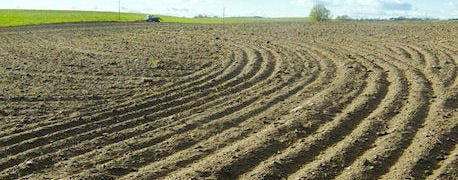September 26, 2012

Stewardship groups concerned about the inconsistency between the House Ag Committee and Senate Farm Bills' terms on the relationship between conservation compliance and crop insurance explained their position in a webinar Tuesday.
The National Wildlife Federation and the Mississippi River Network sponsored the webinar, with input from Bill Gradle, retired Illinois State Conservationist for the Natural Resources Conservation Service, Craig Lang, past president of the Iowa Farm Bureau and Greg Fogel, policy associate for the National Sustainable Agriculture Coalition.

Though a 2012 Farm Bill still waits in the wings for a vote, debate surrounding key provisions in the bill continues.
Conservation compliance, a provision created by the 1985 Farm Bill, includes both highly erodible land (sodbuster), and wetland conservation (swampbuster) provisions, which require producers to agree to maintain conservation practices on certain amounts of land and not use it for ag production.
Though the Senate-passed farm bill does link conservation compliance measures to crop insurance, the House Agriculture Committee-passed bill does not. With just four days until the current Farm Bill expires, and uncertainty surrounding the passage of a new one, some groups are again weighing in on the issue.
Webinar commentators agreed that a connection between crop insurance and conservation compliance is important, and existing connections between the program and other farm bill provisions have already made strides in protecting land.
Craig Lang said taxpayer trust in farmers is a key issue in conservation, and if taxpayers are to provide low-cost revenue protection, they should be rewarded with assurance that the land is appropriately managed.
"I think [conservation compliance and crop insurance] ought to be connected in such a way that it is easy to understand, because farmers are doing the right thing. If farmers are not doing the right thing to protect the soil they should not be in a position where they receive any kind of government support in their farming operation," Lang said.
Greg Fogel agreed, and said crop insurance is quickly becoming a larger part of the safety net.
"This would provide an agreement between producers and taxpayers," Fogel said. He added that a link to conservation compliance would push producers to apply basic soil and wetland conservation mechanisms on their land.
Outside Support
Others have also supported linking conservation compliance to crop insurance.
Just last month, Dan Glickman, U.S. secretary of agriculture in the Clinton administration and Jim Moseley, deputy secretary of agriculture in the G. W. Bush administration, supported the measure in an op-ed article published by political online newspaper The Hill. The two wrote also that the growth of the crop insurance program warrants conservation compliance measures.
"Conservation compliance is needed to protect the gains we've made. Because most farmers are currently covered by compliance, extending conservation compliance to crop insurance premium subsidies will not impact significant numbers of new farmers," they wrote. "Conservation compliance is a proven, effective conservation tool. Without conservation compliance, farmland would be less productive, the threats to our rivers, lakes, wetlands, and soils would be even more severe, and the cleanup bill would be even higher."
Not All Agree
Though supporters of conservation compliance say it provides incentives, opponents of conservation compliance say unintended consequences could surface if it is linked to crop insurance.
In a letter sent earlier this spring to Sen. Debbie Stabenow, D-Mich, chair of the Senate Agriculture Committee, a group of 31 farm groups said attaching conservation compliance measures to crop insurance could undermine the public/private partnership between the federal government and crop insurance companies and cause farmers to lose financing from lenders.
"We believe it unwise to make any changes in this farm bill that would dissuade producers from purchasing crop insurance. If we do not have a workable crop insurance program and a high level of participation in that program, we will invariably fall back into the cycle of annual ad hoc disaster assistance programs," the coalition wrote. "We urge you to reject the linkage of crop insurance with conservation compliance requirements."
You May Also Like




